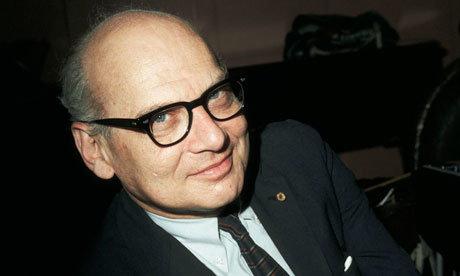One of the things I have never forgotten about that speech, was the funny and sad, but true observations of how all the names for the music field to which Milton belonged were horribly lacking. Milton went on to list each one and their respective shortcomings:
1. Concert Music
2. Serious Music (yes, I kid you not…)
3. Contemporary Classical (an oxymoron)
4. New Music
5. Classical Music
6. 20th Century Music
The people who compose this sort of music are becoming fewer and far between. But don’t be mistaken and think that their work only lives in the Academy, for Milton had his quite a group of musician fans, not the least of which was James Levine. A great investment was made to perform Milton’s works, similar to the effort that might have to be made to read The Sound and The Fury or listen to John Coltrane’s Meditations, but the effort has a great payoff.
We need these composers/scientists, just as we need our Faulkners, Joyces, Melvilles, and Ernico Fermis.
I’ll close this little entry for Milton Babbitt, by recalling the great pride, care, and admiration he evinced during his long tenure chairing the BMI Young Composer Awards. I watched him many times, announce the award, and shake the hand of each winner, and you could see how much being part of this community meant to him and how tickled he was to look at the young composers with their careers in front of them. That look on his face was priceless…
Rest in peace, Milton Babbitt.
______________________________________________________________________________
For those interested in learning more, I would suggest that you read the interview with Mliton in NewMusicBox.org.
Or, buy this really great book of inteviews with some of the greatest composers of the 20th Century, including Milton Babbitt: Talking Music: Conversations with John Cage, Philip Glass, Laurie Anderson, and Five Generations of American Experiemental Composers., by William Duckworth.





What are you smoking? Common Core ELA are completely artless.
Well, my smoking days are over, except for days that my board meets, when the smoke comes out my ears!
Tom, We will have to agree to disagree about Common Core. I feel strongly that both the ELA and math open the door wide, for expanding what literacy means.
Yes, despite recent reports to the contrary, there are still levels in music. Not just performance levels, but within the vast subject itself. There is still a deep end of the pool, and I hope we are still coaching students not to fear swimming in it.
Thanks for sharing this, Mr. Kessler.
— Steve Soderberg
PS: I’m not qualified to talk about ELA, but as a musician who has done a bit of mathematical music theory, I also second your comment “math opens the door wide.” Again, don’t keep kids away from the deep end.